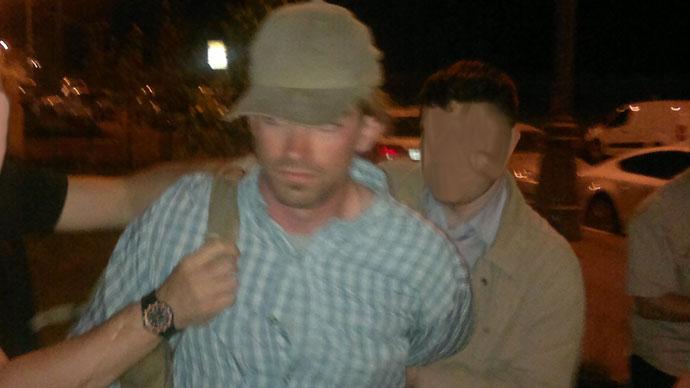American diplomat expelled from Russia for spying evokes memories of Cold War
The Russian FSB released this photo of an American they say is Ryan C. Fogle. They accuse him of spying for the United States. (Photo courtesy of the FSB.)
Russian authorities on Monday detained American Ryan Christopher Fogle, an employee of the U.S. embassy in Moscow.
They accused him of working for the CIA and trying to recruit Russian agents for espionage. Fogle is alleged to have been found wearing a wig, carrying millions of euros and instructions for divulging information to the U.S. via a fake email account. All the stuff of a great spy thriller.
The history of espionage between the West and Russia is long and complicated. But according to Gordon Corera, while the Cold War may be finished, espionage continues. Corera, a BBC correspondent and author of The Art of Betrayal: The Secret History of MI6, called this latest incident a very “retro” kind of spy case.
“This isn’t the world of cyber spies we’ve come to expect,” he said. “When Britain’s MI6 got caught in Moscow a few years ago, at least they were using something high-tech like a spy rock, with a secret transmitter in it.”
Corera called this incident strange and said, in fact, some of this evidence may actually have been planted on Fogle because they wanted to make a point — because they wanted something public to expose.
“It could be because they’re annoyed that he was trying to recruit a Russian intelligence officer and they wanted to send a message. It could be because it serves their political narrative of saying ‘foreign intelligence services are trying to subvert us,’ and you see that in their campaign against NGOs,” Corera said.
According to the Russian account, Fogle was trying to recruit someone who worked in counter-terrorism, which may be a U.S. effort, in the aftermath of Boston, to find out what more the U.S. knows about what’s going on in the Caucus region.
All of this is to say there could be a number of motives behind both the U.S. behavior and the Russian behavior, made even more complicated by the Russian decision to make the whole matter public.
It remains to be seen how the American administration responds to Russia’s move. In times past, a Russian who the U.S. believed was an undercover spy would be sent home in retaliation for the Russian decision.
It’s all very Cold War. But it’s been decades since the Cold War ended.
